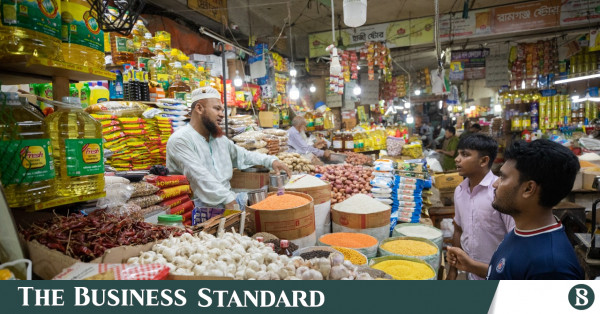The ministry will publish international, wholesale and retail market prices of these essential commodities on its website
- The commodities include rice, flour, edible oil, salt, ginger, cumin, coriander, cardamom, pepper and turmeric powder, bay leaf, cloves, cinnamon
- Ministry says ample supply of essentials during Ramadan
- The taskforce on commodity price will hold meetings every month from now on
In order to control the abnormal rise in the prices of commodities, the commerce ministry has decided to set the retail and wholesale prices of 17 essential items.
The commodities include rice, flour, edible oil, salt, ginger, cumin, coriander, cardamom, pepper and turmeric powder, bay leaf, cloves, cinnamon, etc, which are covered by the Essential Commodities Act.
The decision was made at a meeting of a taskforce on commodity prices held at the commerce ministry in Dhaka on Tuesday (20 February).
Attending the meeting, State Minister for Commerce Ahsanul Islam Titu said the wholesale and retail prices of these commodities will be determined in accordance with the Act.
Officials from the commerce ministry who attended the meeting on a condition of anonymity told TBS that the ministry will publish international, wholesale and retail market prices of these essential commodities on its website regularly.
The taskforce will hold meetings every month from now on, they said.
Under the law, the government may take various measures, including price fixation and prevention of hoarding, as necessary for the commodities, they said. The commerce ministry currently follows the law to fix the maximum prices of edible oil and sugar at the retail, wholesale and mill gate levels, said the officials.
In 2012, the government included 13 commodities, including edible oil, sugar, salt and spices, by amending the law.
The food ministry has already made it mandatory to write the mill gate price on the bags of rice in order to determine the retail price of different types of rice. The commerce ministry will determine the maximum retail prices of rice, based on the mill gate prices. The retail price of flour will be determined by adding the company’s operating cost and profit to the wheat import cost and processing cost.
The edible oil and sugar mills control the majority of the country’s market for flour and premium rice. As a result, officials of the commerce ministry believe that it will be easy to determine the prices of these two commodities and make them effective.
Although the agriculture and fisheries and livestock ministries determined the production costs of eggs and potatoes last year, the commerce ministry could not implement the price fixation of these two commodities at the wholesale and retail levels.
The commerce ministry also has an initiative to amend the Essential Commodities Act 1956 to control the market prices of essential commodities. The law covers commodities like drinking water, fish, poultry, milk and eggs, soap, detergent powder, toothpaste, potato, wheat, paddy, black cumin, green chilli, puffed rice, flattened rice, and liquid pesticides.
Dollar rate impact
The state minister at the meeting asked the traders to explain why they are not reducing the prices of various consumer goods in the domestic market even though the prices have decreased in the international market. The traders cited rising dollar prices as a reason.
They argued that a year ago, they used to open LCs for importing goods at the rate of Tk107-108 per dollar. Now they have to spend Tk123-124 per dollar to open LCs.
At the time, the state minister said that according to Bangladesh Bank data, the price of the dollar is now 110 taka. He asked Bangladesh Bank representatives present at the meeting for an explanation why LCs are being opened at such a high price.
The central bank officials could not give any explanation in this regard, the officials said.
According to the central bank, the price of each dollar was Tk107 on 14 February last year, and this year on the same day, the price stands at Tk110.
An official of the commerce ministry, who reviews product prices, told TBS, “We do not know at what dollar rate the traders open LCs. However, they present documents showing that they have opened LCs at the rate of Tk123-124 per dollar at the time of price review.”
According to commerce ministry data, sugar imports decreased by 72,000 tonnes in the last 13 months compared to the same period a year ago. Imports of refined and unrefined soybean oil and soybean seeds decreased by about 54,000 tonnes in the same period. In addition, onion imports decreased by more than 20,000 tonnes during the period.
However, imports of lentils, chickpeas, dates and palm oil increased significantly in the last 13 months compared to the same period a year ago. However, the international market price of chickpeas, lentils and sugar increased this year compared to last year.
Although the demand for sugar, edible oil and onions remains higher during Ramadan, commerce ministry officials believe that there will be no shortage of goods this time.
They argue that the demand for consumption has decreased even more than the amount of imports that have decreased, due to the increase in prices. As a result, there is no fear of a shortage of these commodities during the upcoming Ramadan, they say.
The state minister said, “The traders have assured us that there will be enough stock of commodities for Ramadan.”




